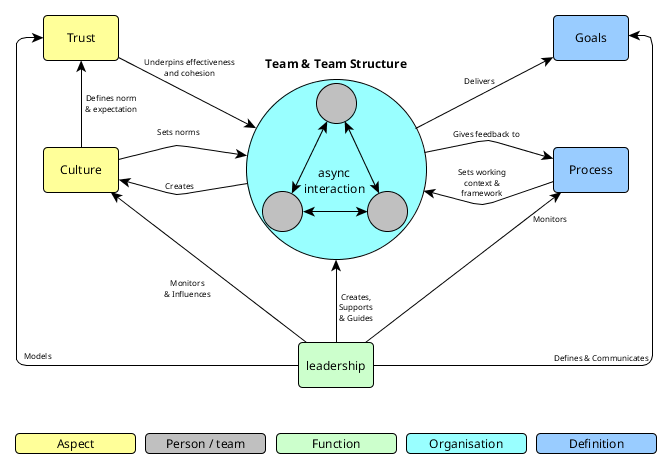Ownership and Responsibility
I find these are two commonly misunderstood and (some times purposefully) abused terms.
Ranges from been give it knowingly, or having it assume of one. Typically manifests itself when something goes wrong and is seen in the form of the blame game. Is usually passed down in organisations (where as it should go up) by weak management looking to "prove fault" in employees to cover up their (lack of quality) decisions.
In a healthy and honest situation responsibility can be a good starting place for defining a role and calculating suitable reward for success, when the role is able to create and effect any needed changes.
In an evolved and dynamic environment it is a shared understanding of the team functioning as a whole, a "burden shared" and all that.
Though unfortunately rare.
Tends to encompass responsibility with the added bonus of relative share of the rewards of success. Common misuses of this term are typical when employees are told "they have to take ownership" or "you really own this now" by management, when in fact all they have is slopey shoulder passed down responsibility and no actual ownership at all.
A common manipulation used by management being to associate the negative aspects of a project to individuals and account their so called "ownership" to the faults (which are actually typical managements fault) until they go away.
Once again, the blame game.
In evolved and flattened organisations, the team has no management, it has leaders who are actually people who engage in the work and share and support making decisions, it's team facilitation not top down (detached and ignorant) condescending commands.
Unfortunately again a rare, though starting to grow approach as the non team focused approaches will be taken out by the shear scale of inefficiency and employee misery.
Paul Thomas is doing some good work in the field : http://businessdoctorme.blogspot.com/
1) If you are accused of not "owning" a project, when all you actually have is the responsibility of the blame from managements previous poor decisions, walk away. If they can't accept their mistakes and constantly prove their inability to change, then it's not worth the emotion & time.
2) Work for ......... a company where there is actual ownership, i.e. shared profits.
3) Start a....... a company where there is actual ownership, i.e. shared profits.
4) Don't compromise and don't accept weak approaches as the norm.
Responsibility
Ranges from been give it knowingly, or having it assume of one. Typically manifests itself when something goes wrong and is seen in the form of the blame game. Is usually passed down in organisations (where as it should go up) by weak management looking to "prove fault" in employees to cover up their (lack of quality) decisions.
In a healthy and honest situation responsibility can be a good starting place for defining a role and calculating suitable reward for success, when the role is able to create and effect any needed changes.
In an evolved and dynamic environment it is a shared understanding of the team functioning as a whole, a "burden shared" and all that.
Though unfortunately rare.
Ownership
Tends to encompass responsibility with the added bonus of relative share of the rewards of success. Common misuses of this term are typical when employees are told "they have to take ownership" or "you really own this now" by management, when in fact all they have is slopey shoulder passed down responsibility and no actual ownership at all.
A common manipulation used by management being to associate the negative aspects of a project to individuals and account their so called "ownership" to the faults (which are actually typical managements fault) until they go away.
Once again, the blame game.
In evolved and flattened organisations, the team has no management, it has leaders who are actually people who engage in the work and share and support making decisions, it's team facilitation not top down (detached and ignorant) condescending commands.
Unfortunately again a rare, though starting to grow approach as the non team focused approaches will be taken out by the shear scale of inefficiency and employee misery.
Paul Thomas is doing some good work in the field : http://businessdoctorme.blogspot.com/
Conclusion
1) If you are accused of not "owning" a project, when all you actually have is the responsibility of the blame from managements previous poor decisions, walk away. If they can't accept their mistakes and constantly prove their inability to change, then it's not worth the emotion & time.
2) Work for ......... a company where there is actual ownership, i.e. shared profits.
3) Start a....... a company where there is actual ownership, i.e. shared profits.
4) Don't compromise and don't accept weak approaches as the norm.


Nice one Jeremy.
ReplyDeleteTo all:- Give them a copy of Tom DeMarco's Peopleware on the way out. I did.
Like Jeremy said - vote with your feet. I did that too.